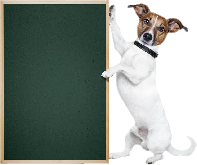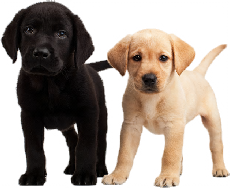

Sage Vets © All Rights Reserved Terms of Business

1 Salisbury Road
Low Moor
Bradford
West Yorkshire
BD12 0AA
01274 679192
1 Reva Syke Road
Clayton
Bradford
West Yorkshire
BD14 6QN
01274 884800
9 Kaye Street
Heckmondwike
West Yorkshire
WF16 0JN
01924 412292


Advice
for
pet owners
PUPPY SOCIALISATION
Bringing a new puppy home is an exciting time but it can also be a lot of work. Here are a few pointers to help make owning your dog a fun and rewarding experience for everyone involved.
Between the ages of 7 and 14 weeks your puppy goes through what is called the SOCIALISATION PERIOD.
This is the time at which your puppy is receptive to novel experiences and more likely to take them in its stride. By introducing it to everything it will encounter throughout life whilst still at a young age, ideally within this socialisation period, you increase the chances of having a well adjusted, confident, adult dog. If carefully exposed to a variety of experiences - people, animals, smells etc. your dog will learn to accept them. A lot of the problems we see in practice are a result of poor socialisation.
Think about what you want your dog to be comfortable with in its adult life. Here is a list of suggested experiences to get your puppy used to:
- People - of all sizes, shapes, ages and colours. Hats, motorcycle helmets, umbrellas, walking sticks, sunglasses etc. This is an opportunity to get your friends dressed up in daft clothing, wigs etc, so make the most of it.
- Animals - dogs, cats, horses, sheep, cows
- Sounds - hoover, washing machine, traffic noise, fireworks etc. A CD with collections of noises is the best way to expose your puppy to all these sounds gradually. These are available from most good pet shops.
- Cars/Buses/Trains
Each puppy is different and some need more gradual exposure to new things than others. Watch your puppy for signs of fear and go at a pace that is suitable for them. Don’t be surprised if it takes weeks to get your puppy used to certain things.
If your puppy has a fearful response to anything, avoid reassuring the puppy too much because you are more likely to reinforce the fearful behaviour. By acting as though nothing scary is happening and allowing the puppy to observe you being calm you demonstrate that there is nothing to fear. Reward calm confident behaviour at all opportunities. The main thing is to make all experiences fun with treats, praise and play.
Socialising vs Vaccinations
Owners often ask how they can socialise their puppies when they are not yet vaccinated. Whilst it is important that contact with unvaccinated dogs is avoided until one week after their second vaccination, your puppy doesn’t have to stay confined to the house. On the contrary – carry your puppy about so it can meet people and hear strange noises. In addition, contact with friendly dogs which you KNOW are vaccinated in a safe environment is fine.
